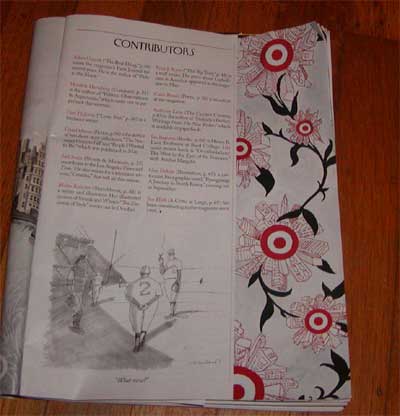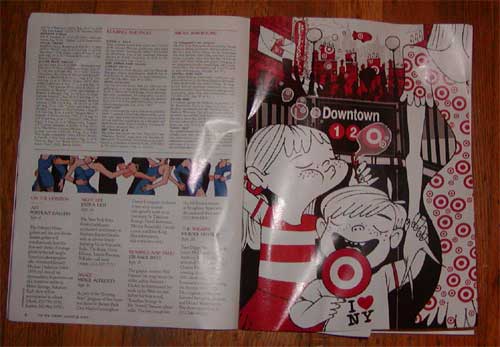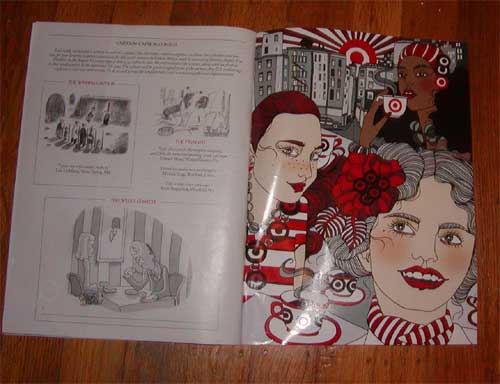While I am sure the following story is not reflective of this company as a whole (and I refuse to link to this specific advertising agency, lest they be encouraged), I offer this parable of how not to promote your company.
The whole thing started some weeks ago — on August 12, to be precise. I received an email from Valerie Leclercq of The Night Agency, a small advertising company. Valerie apparently had confused my address with “adrants.com” and she was pitching me on an advertising method that involved displaying a large banner along the side of a building. As regular readers know, I am about as much a fan of advertising as I am of lima beans. In short, the most effective way to get on my bad side is to bombard me with unwanted advertising, just as the unthinking Valerie, who wasn’t even professional enough to double-check her recepient address, managed to do.
Neverthless, I sent back the following response, ccing Steve Hall (the intended recepient) over at adrants.com:
Valerie:
Thank you for the link to a product from your company, but I’ll have to pass. Advertising that defaces a building, whether obtrusive or less so, is still advertising. Why does the building even have to have advertising at all? What of the people behind that poster who won’t be able to see out into the street during the period that the banner is up? I don’t understand how making advertising more deceptive is somehow better, nor do I understand why you think my site, which has criticized rampant advertising on several occasions, would be interested in this sort of thing.
Perhaps you intended to contact adrants instead of edrants. My site deals predominantly with literary issues and is, in fact, quite against defacing the world we live in.
Nevertheless, I’m forwarding your email onto my more advertising-happy colleague in the blogosphere.
All best,
Ed
I didn’t receive a response back, although the good Mr. Hall did offer me a hearty one-line snicker.
And then yesterday, Valerie deigned to contact me again, reproducing the same sin that . She sent me an email with the subject line “hello there champion” that included a file with a virus in it (which my two antivirus programs immediately deleted). It read as follows:
Hi Edward,
Just curious what you’re going to say about this. No need to forward to Steve Hall. He got it awright
Think of all the people you could iss off with just one ost (ooops must have dropped the P again…)
[URL deleted]
hey, no bad feelings
Val
[file with virus attached]
It seemed clear to me that “dropping the pee,” so to speak, meant trying to infect my computer. This was indeed the ultimate in viral advertising!
Of course, Ms. Leclercq made an unfortunate mistake. She didn’t know that she was dealing with a very methodical man who follows up.
I managed to track down Scott Cohn, one of the main people behind the Night Agency, and gave him a phone call this morning. I told him who I was and asked him if Valerie was in his employ. He said that she was. I then told him that Ms. Leclercq had sent me an email with a virus in it and whether this was the kind of impression that his company liked to convey. Cohn told me that Ms. Leclercq was “more of a snail-mail person,” that she wasn’t particularly tech-savvy and that she often got “a bit excited” about promoting her work. This kind of behavior wasn’t like her at all. That may be the case, I said, but all of this email was unwanted and possibly vituperative. And was this really the way he wanted to promote his company? To Cohn’s great credit, he apologized and offered to look into the email in question. And because of this, I give Cohn and the Night Agency the benefit of the doubt.
This still, however, does not undermine the following:
1. Unwanted emails were sent to the wrong people, thus creating a very bad impression in my mind.
2. Despite a clear response from me expressing my lack of interest, Ms. Leclercq, on company policy, again sent unwanted emails to the wrong person, possibly with a virus.
3. Person who received unwanted email, fueled by a sense of justice, then publicly wrote about the incident.
Now let’s say Ms. Leclercq had done something as simple as, oh say, visiting “edrants.com,” unearthing the obvious fact that it’s a literary blog, not an advertising blog. Let’s say that Ms. Leclercq had asked around the office, “Can you confirm the name of that advertising blog for me?” Let’s say that she would have written an email apologizing for the email. Would any of this have happened? Probably not. I certainly wouldn’t have written about it here. But whether through hubris or ignorance (or a little of both), Ms. Leclercq couldn’t even perform the basics of professionalism and the Night Agency, which appears to be doing something a bit different in the advertising world, would not have created such a bad impression.
Everyone makes mistakes. But I have to ask: If the Night Agency is willing to employ such airheads at their office, what kind of dunces do you think they’d employ for your client?


